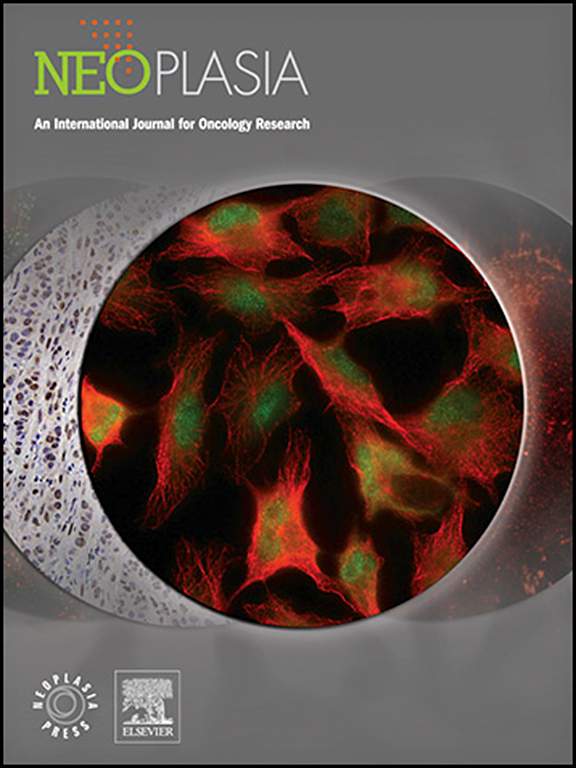ARID1A 缺失使结直肠癌细胞对氟尿嘧啶敏感
IF 4.8
2区 医学
Q1 Biochemistry, Genetics and Molecular Biology
引用次数: 0
摘要
富含AT的交互结构域1A(ARID1A)的功能缺失突变经常发生在各种癌症中,这使其成为一个很有前景的治疗靶点。在本研究中,我们在 ARID1A 异源结直肠癌(CRC)细胞中筛选了美国食品与药物管理局(FDA)批准的药物库,发现 ARID1A 缺失会使 CRC 细胞在体内和体外对用于治疗 CRC 肝转移的抗肿瘤药物氟尿嘧啶(FUDR)敏感。作为一种嘧啶类似物,FUDR 通过抑制胸苷酸合成酶(TS)的活性诱导 DNA 损伤。ARID1A 作为 DNA 损伤修复的调节因子,一旦缺失,会加剧 FUDR 诱导的 DNA 损伤,导致细胞凋亡增加。具体来说,ARID1A的缺乏会通过下调Chk2磷酸化来损害DNA损伤修复,从而使癌细胞对FUDR敏感。值得注意的是,我们发现与治疗 CRC 的常用抗癌药物 5-氟尿嘧啶(5-FU)相比,FUDR 在 ARID1A 缺乏的细胞中表现出更高的敏感性。这表明,FUDR 在治疗 ARID1A 缺失的 CRC 方面优于 5-FU。总之,ARID1A 缺失会促进 FUDR 诱导的 CRC DNA 损伤,从而显著提高对 FUDR 的敏感性。这些发现为治疗以 ARID1A 功能缺失突变为特征的 CRC 提供了一种新的治疗方法。本文章由计算机程序翻译,如有差异,请以英文原文为准。
ARID1A loss sensitizes colorectal cancer cells to floxuridine
The loss-of-function mutation of AT-rich interactive domain 1A (ARID1A) frequently occurs in various types of cancer, making it a promising therapeutic target. In the present study, we performed a screening of an FDA-approved drug library in ARID1A isogenic colorectal cancer (CRC) cells and discovered that ARID1A loss sensitizes CRC cells to floxuridine (FUDR), an antineoplastic agent used for treating hepatic metastases from CRC, both in vivo and in vitro. As a pyrimidine analogue, FUDR induces DNA damage by inhibiting thymidylate synthase (TS) activity. ARID1A, as a regulator of DNA damage repair, when lost, exacerbates FUDR-induced DNA damage, leading to increased cell apoptosis. Specifically, ARID1A deficiency impairs DNA damage repair by downregulating Chk2 phosphorylation, thereby sensitizing cancer cells to FUDR. Notably, we found that FUDR exhibited increased sensitivity in ARID1A-deficient cells compared to 5-fluorouracil (5-FU), a commonly used anticancer drug for CRC. This suggests that FUDR is superior to 5-FU in treating ARID1A-deficient CRC. In conclusion, ARID1A loss significantly heightens sensitivity to FUDR by promoting FUDR-induced DNA damage in CRC. These findings offer a novel therapeutic approach for the treatment of CRC characterized by ARID1A loss-of-function mutations.
求助全文
通过发布文献求助,成功后即可免费获取论文全文。
去求助
来源期刊

Neoplasia
医学-肿瘤学
CiteScore
9.20
自引率
2.10%
发文量
82
审稿时长
26 days
期刊介绍:
Neoplasia publishes the results of novel investigations in all areas of oncology research. The title Neoplasia was chosen to convey the journal’s breadth, which encompasses the traditional disciplines of cancer research as well as emerging fields and interdisciplinary investigations. Neoplasia is interested in studies describing new molecular and genetic findings relating to the neoplastic phenotype and in laboratory and clinical studies demonstrating creative applications of advances in the basic sciences to risk assessment, prognostic indications, detection, diagnosis, and treatment. In addition to regular Research Reports, Neoplasia also publishes Reviews and Meeting Reports. Neoplasia is committed to ensuring a thorough, fair, and rapid review and publication schedule to further its mission of serving both the scientific and clinical communities by disseminating important data and ideas in cancer research.
 求助内容:
求助内容: 应助结果提醒方式:
应助结果提醒方式:


